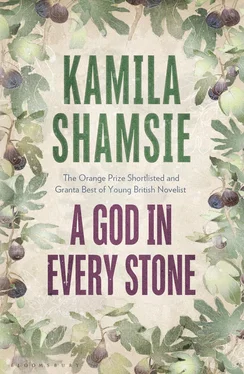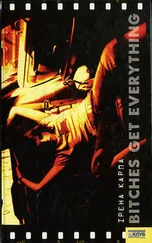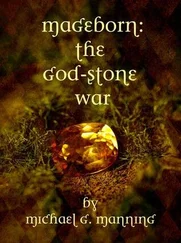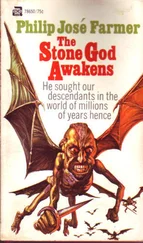This thought first came to him when he looked at the great chandelier in Ward 1, its immensity hanging from the claw of a silver dragon; the long-tongued beast, in turn, descended from copper banana leaves which seemed to grow straight out of the painted foliage on the ceiling. Was it beautiful or ugly, he couldn’t decide. But he knew that this one chandelier had more grandeur than all of Peshawar. In time, he came to see the chandelier as Empire — the King was the silver dragon, one single claw bearing the weight of smaller dragons, glass lotus flowers, a star of mirrors. He repeated this to one of the English doctors, and thereafter he was called upon whenever there were important visitors to explain that when he looked at the chandelier he gazed upon the glory of the King. What he said was a source of marvel equalled, if not exceeded, by the fact that he said it in English. When the supervising nurse was there to hear the compliment she’d wink at Qayyum and place a finger on her lips — she was the one who had taught him the English words he hadn’t known, polished the grammar of his sentences, explained that the glass objects were lotus flowers and not replicas of the dusters which the staff used to clean the chandelier.
It was astonishing how easy the nurses here made it to be in the presence of a woman who wasn’t mother or sister or wife. In the wards the soldiers talked endlessly about white women — not just the nurses but also the French farm girls some of them had bivouacked with and the female aviator who one of them swore he’d met (no one believed him, but everyone asked him to tell the story over and over). Nothing about France or England was more different from India than the women — and from here it was a step some of the soldiers made to declare that if India’s women changed then India too would become prosperous like the white nations, and everything from the livestock to the people would have a gleam to it. Qayyum listened to them and tried to imagine telling his mother she should be more like the women of Europe — she’d hit him about the ears with a shoe as if he were still a child.
Without warning, the air became driving rain and Kalam’s words smeared across the page. Qayyum ducked his head and, as quickly as his fumbling hands could manage, threw the blanket over his head, covering it completely. The day his youngest sister put on a burqa for the first time she wore it backwards, no face-mesh for sight or breath, and she had burst into tears until Qayyum lifted it off and put it on the right way round; she was still young enough to throw her arms around him and say, Lala, forget the Army, stay here and defend us from our mistakes. Even the lost eye didn’t make him wish he’d listened. Here he was, in the King’s own palace.
But there was another side to this world and Kalam Khan was in it, regretting his soldier’s uniform, the brotherhood of the 40th, the honour of service. Qayyum wondered who had written Kalam’s words for him now that he wasn’t there to do it, and if the letter-writer had left anything out. Qayyum recognised a process of selection as part of his own duty as letter-writer to the wounded, unlettered men at the Pavilion. So many of them asked him to write home for God’s sake don’t don’t don’t allow my brother my cousin anyone from our village to sign up. Such words would never get past the censors, and they would reflect poorly on the Indian troops who had been trusted to come halfway round the world to fight for their king though there were many in England who thought their loyalty would fail the challenge.
— Any doubts about you are held only by those who’ve never had the honour of serving beside you.
That was the only thing the English officers said, or needed to say, when the 40th set sail for France.
The rain was knocking on the blanket and pain was responding, yes, yes, I’m here, I haven’t really gone away. He peeled the wet wool away from his face and held it above his head like a canopy; the relief of emerging from the clinging fabric was immense. Across the garden he saw a limping figure. It was the sepoy whose ankle had been shattered by a bullet and whose lungs were weakened by chlorine gas; soon he would be sent back to France. His letter had been addressed to the King-Emperor himself, complaining that wounded Indians were sent back into the field with injuries that would allow an English soldier to return home. Qayyum wrote down every word the man said, knowing it would never reach the palace. The letter ended: If a man is to die defending a field, let the field be his field, the land his land, the people his people .
Two nurses approached, umbrellas held above their heads. Flanking Qayyum like bodyguards, they each placed a hand on his upper arms and guided him back to the ward, his one remaining eye closed to protect it from the piercing rain.
He saw the supervising nurse approach when he was in the Pavilion garden reading aloud a letter which one of the sepoys had received from his wife. The sepoy wept in his wheelchair, knowing that his wife’s dreams of the children they would have together when he returned would never be realised. Qayyum thought the nurse was there to let him know that the car was ready to take him to the glass maker’s to be measured for an eye, but despite his eagerness to walk through the world with the semblance of a whole man he finished reading the letter and sat with his hand on the sepoy’s shoulder for a period of time until the man’s sobbing quietened before walking over to where she stood beneath a tree.
— You are very kind with the men, Lance-Naik. I think you must spend half your day reading or writing letters for others.
— It helps the day become night.
— Yes. Well, I wanted to say goodbye, and good luck.
— I am going?
— Not you.
She glanced over her shoulder, and spoke to the Englishman in civilian clothes who had approached unobserved.
— Put this in your report. Tell them a fifty-six-year-old widow was seen giving signs of favour to a Pathan boy. Let the Empire tremble at that.
Turning back to Qayyum, she pressed her handkerchief into his hands.
— When you have your new eye you may want something to wrap it in at night.
He didn’t immediately understand. Not that day or the one after, not even when he realised all the female nurses had left. But later in the week, on an excursion to the pebbled seafront, he met two fellow NCOs of the Lahore Division — a Sikh and a Rajput — who said all the women had been removed from York Place Hospital as well.
— Have the English decided women shouldn’t see wounded men? Qayyum asked.
The Sikh merely grunted, picking up a pebble with the hand that remained — his left — and concentrating all his attention on readying to throw, the sleeve on his right side flapping. It was early in the morning, the sun had barely risen; the hour when disfigured men went out into the emptied world.
But the Rajput with half a face in bandages and the rasping voice of one who has swallowed gas made a sound of derision.
— They haven’t removed them from all hospitals. Just the ones with Indian patients.
— Why?
— Why do you think? Why do you think the Englishwomen who come to visit you in the wards and tell you how much the Empire owes you are never young and never out of sight of an Englishman?
The Sikh flung the pebble, his entire body pivoting. Qayyum stepped away from him, shielding his good eye. If the Rajput hadn’t been there to steady the Sikh he would have fallen to the ground. The pebble landed on another pebble — a sharp clinking sound — and the sea rushed in to cover it. The Sikh pushed the Rajput away, tottered, regained his balance, and when he spoke his face was a snarl.
— They’re right to worry. I’m going to find every Englishwoman whose husband is at war and quench her thirst for a man.
Читать дальше












